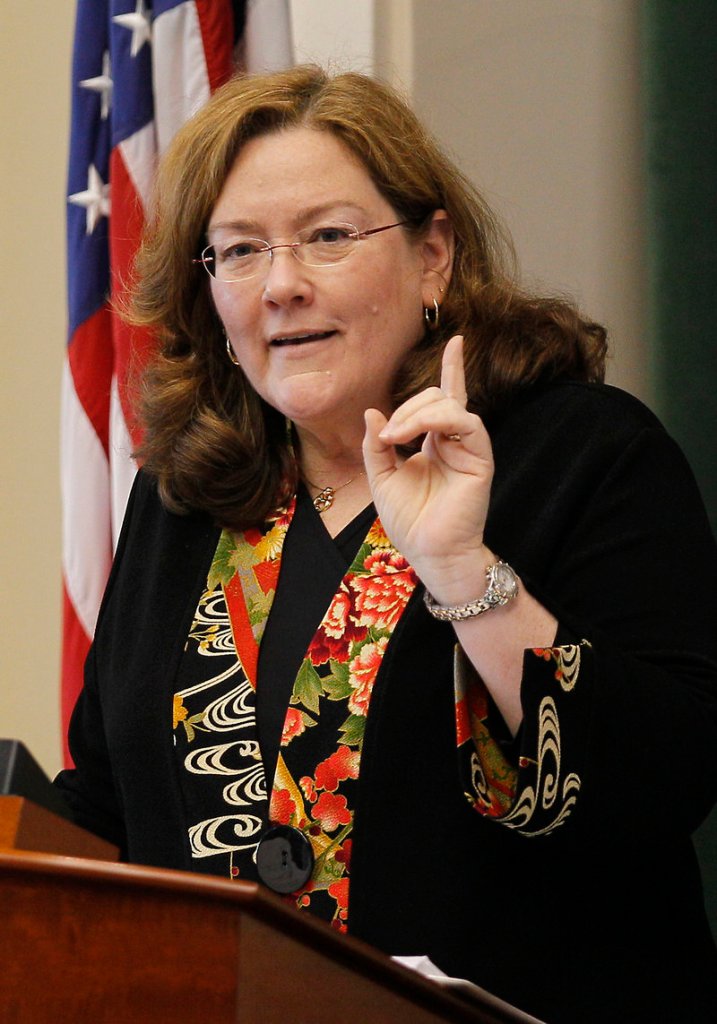AUGUSTA — Maine’s court system is acting swiftly to prevent domestic violence by tightening up bail rules for alleged abusers, Chief Justice Leigh Ingalls Saufley told the Legislature on Thursday.
In her annual State of the Judiciary address to a joint House-Senate session, Saufley drew applause when she announced that effective immediately, bail commissioners must not set bail in domestic violence-related cases unless they have access to the defendant’s criminal history.
“We know that one of the most important tools in averting repeated violence is for judicial officers to have the criminal records of the person charged with domestic violence,” Saufley said. “Without that history, informed decisions cannot be made.”
But she said that too often, bail commissioners aren’t getting those records, and “this is simply unacceptable.”
Gov. Paul LePage, who sat in the House chamber during the speech, commended Saufley for taking “a proactive step” that will bring about “meaningful change.” LePage has made prevention of domestic abuse a priority and plans to submit legislation on the issue this session.
Citing figures from the attorney general, Saufley said that in the past five years, 57 people were killed in domestic violence related assaults in Maine.
“And that doesn’t address the thousands who have been injured, isolated, or sexually assaulted, many of whom live in daily fear,” Saufley said.
Court security, which has long been a concern of the chief justice, has improved, Saufley told lawmakers.
The $55 million-per-year court system has been able to fill all 10 additional court security positions the Legislature created five years ago but have gone mostly unfilled because of state budget cuts.
The additional staffing has enabled the courts to provide entry screening, such as that which has recently gone into effect in the State House, on nearly a third of the days court’s in session, Saufley said.
“This represents a substantial improvement,” said the chief justice, adding that “the potential for stressed, angry, or out-of-control litigants to arrive in a courtroom with lethal weapons is slowly diminishing.”
Borrowing an idea from New Hampshire, Maine courts are also making it easier on people who have questions or need guidance in their dealings with the courts, said Saufley. A central phone service has been started, which funnels calls to a central location rather to individual courthouses. This frees up clerks and provides the public “with a real human voice at the end of the phone line,” she said.
Callers can find out, for example, when their cases are scheduled, which courthouse they must go to, what time they have to be there, and more general questions about issues such as divorce or criminal laws, Saufley said after the speech.
“One of the things we hear now is the frustration from the public because our clerks are overwhelmed, the phones ring constantly, people are put on hold, and they don’t always reach the person who will have the specific information they need. In New Hampshire, after the first week of their pilot project with 20 staff members, the central services staff went to one of the clerk’s offices they were serving and got a standing ovation from the clerks,” said Saufley.
The public will also get a closer view of what goes on in the state’s highest court as of April 10, when the Maine Supreme Judicial Court begins live-streaming oral arguments, Saufley said.
Saufley said the courts this year will be able to fulfill a long-term goal by consolidating all Superior and District Court clerks’ offices that were located in the same town or city. Of the 46 offices in existence several years ago, 15 have been eliminated.
“Not only is this more efficient and cost-effective for the taxpayer, it is less confusing for the public,” Saufley said. The head of the state court system has also expressed concern over providing adequate legal services for the indigent.
In October, Saufley announced a program to publicly recognize attorneys who provide free legal services to people in need. She said donated services are especially important in today’s harsh economic climate.
Send questions/comments to the editors.



Success. Please wait for the page to reload. If the page does not reload within 5 seconds, please refresh the page.
Enter your email and password to access comments.
Hi, to comment on stories you must . This profile is in addition to your subscription and website login.
Already have a commenting profile? .
Invalid username/password.
Please check your email to confirm and complete your registration.
Only subscribers are eligible to post comments. Please subscribe or login first for digital access. Here’s why.
Use the form below to reset your password. When you've submitted your account email, we will send an email with a reset code.